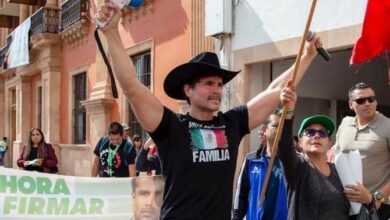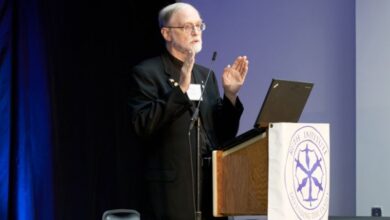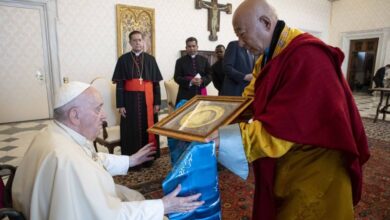First Ratzinger Prize winners since Pope Benedict's death go to two Spanish theologians
CNA Staff, Nov 10, 2023 / 16:06 pm (CNA).
Two Spanish theologians are the winners of the 2023 Ratzinger Prize, named for the late Pope Benedict XVI.
Father Pablo Blanco-Sarto, 59, a professor at the University of Navarra, which is affiliated with Opus Dei, has written extensively about the former Joseph Ratzinger, including a biography of him. He is also on the editorial committee that translates the late pope’s works into Spanish. He primarily teaches ecumenism, sacramental theology, and ministry, according to a written statement from the Joseph Ratzinger-Pope Benedict XVI Vatican Foundation, which gives the award.
Francesc Torralba Roselló, 56, a professor at Ramon Llull University in Barcelona, has written more than 100 books. He focuses on philosophical anthropology and ethics, according to the foundation. He is married and has five children.
Blanco-Sarto told CNA, “I am delighted and relieved to receive this award. A joy because of the name it bears, that of Joseph Ratzinger. A relief because I have been studying his life, his work, and his thought, and this award is an endorsement of the results of my research.”
He attributed winning the award to the work of other theologians in Spain, singling out Father Antonio Aranda, a retired theology professor who recently died.
“All award is a shared merit; it transcends the person himself,” Blanco-Sarto said, according to a written statement from the University of Navarra.
Nominees for the award must get approval from the pope to make the short list.
While Pope Francis, 86, ordinarily presents each award personally, this year the Vatican’s secretary of state, Cardinal Pietro Parolin, 68, plans to do so instead, later this month.
The foundation was founded in 2007 by former students of Ratzinger when he was a theology professor in Germany from 1958 to 1977.
In 2010, then-Pope Benedict donated money to the foundation to create what one cardinal called a kind of “Nobel prize in theology.”
The Ratzinger Prize is awarded yearly to two or three people. Most are Catholic theologians. But winners have included a Church of England biblical scholar, a Lutheran theologian, a Swiss Catholic architect, an Eastern Orthodox musician from Estonia, and a Jewish law professor from South Africa who teaches in New York.
Only one native-born American has won the award so far: In 2012, Father Brian Daley, a Jesuit priest and retired theology professor at Notre Dame who is an expert on the Church Fathers.
Blanco-Sarto and Torralba are the 27th and 28th winners since the first prizes were awarded in 2011.
The foundation makes money from sales of the former pope’s books, particularly the three-volume “Jesus of Nazareth,” which presents the life and teachings of Jesus using history, theology, and Scripture scholarship.
Joseph Ratzinger was born in Germany in 1927. He was ordained a priest in 1951. He spent much of the first half of his life as an academic. He was a “peritus,” or expert, at the Second Vatican Council during the early 1960s, advising the then-archbishop of Cologne. His 1968 book “Introduction to Christianity” established him as a widely known theologian in the Catholic Church.
In 1977, the pope of the time, St. Paul VI, plucked Ratzinger from the university ranks to become archbishop of Munich and Freising in southern Germany. In 1981, St. John Paul II appointed Ratzinger head of what was then known as the Congregation for the Doctrine of the Faith, one of the highest posts in the Vatican.
Ratzinger served in that position until becoming pope in 2005, taking the name Benedict XVI. He resigned from the papacy in 2013, taking the title of pope emeritus. He died in December 2022 at age 95.
The Ratzinger Foundation announced this year’s award winners on Nov. 3.
Cardinal Parolin plans to present the awards Nov. 30 at the Apostolic Palace at the Vatican, one day after a conference on Pope Benedict’s spiritual and intellectual legacy at the Pontifical Gregorian University.
This article was updated on Nov. 11, 2023.





